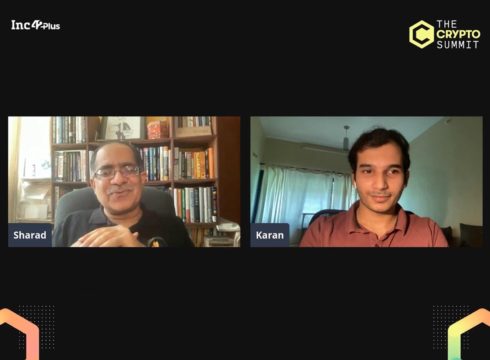SUMMARY
— The Reserve Bank of India (RBI) is an exception in pushing the Account Aggregator (AA) policy which can be replicated for the crypto stack too, to help the fintech sector scale
— With the Open Credit Enablement Network (OCEN), we are working on a system to enable multiple lending parties together to provide low-cost, cash flow based loans
— The Gujarat International Finance Tec-City (GIFT) will be the touch-point for crypto assets to come in, following which the crypto assets can be used in a compliant way via the OCEN framework, says Sharma
Inc42 Daily Brief
Stay Ahead With Daily News & Analysis on India’s Tech & Startup Economy
As India gets prepared for a crypto revolution, a crypto stack is going to be a happy disruption for the fintech industry and to enable this new ecosystem, regulation has to make a shift from a pure one to a techno-legal one, as we have seen in the case of account aggregator (AA) which is a RBI-regulated entity and data, according to Sharad Sharma, cofounder at iSPIRT Foundation.
Kicking off the two-day conference — The Crypto Summit by Inc42 Plus and CoinSwitch Kuber, Sharma of iSPIRT Foundation, which is a think tank for the Indian software products industry, said that the Reserve Bank of India (RBI) is an exception in pushing such Account Aggregator (AA) policy which can be replicated for the crypto stack too.
“A similar framework, with Open Source technology and automated trust can help India scale, and is the key to unleash business potential and disrupt India’s Fintech sector,” Sharma said.
Here are some of the key points he, along with Karan Sirdesai, volunteer, iSPIRT Foundation, made at the India’s largest Crypto Summit:
- With Open Credit Enablement Network (OCEN), we are working on a system to enable multiple lending parties together to provide low-cost cash flow based loans
- OCEN is a new paradigm for credit that seeks to provide a common language for lenders and marketplaces to build innovative, financial credit products at scale
- Project Sakhi is working on pushing money from crypto markets to the lending ecosystem in the most compliant way. We will bring Crypto, Defi investors to lend to MSMEs, says Karan Sirdesai
- Project Sakhi will be an open design ecosystem. We see this as a great opportunity for the Indian MSMEs and for crypto to get a strong foothold in the market
- Using a digital asset pool (DAP), which will be blockchain agnostic, via a smart contract layer, we want to channel this capital to Indian MSMEs. The Indian MSME credit opportunity is estimated to be around $300 Bn
- The Gujarat International Finance Tec-City (GIFT) will be the touch point for crypto assets to come in, following which the crypto assets can be used in a compliant way via the OCEN framework
- A Techno-legal framework seen around the account aggregator (AA) as well as data in India can help us do the same with Crypto stack and help ‘hack’ trust in the future
With an estimated 15 Mn users and a $6.6 Bn market size, the Indian crypto industry may not be the biggest in the world, but it ranks second in a list of countries with the highest crypto adoption rate. We have seen 3x growth in the number of users or investors since 2018 and 7x growth in crypto transactions since last year. This underscores the potential that the Indian market may soon unleash.
Better still, the Indian government is close to classifying cryptos as digital assets, in line with what crypto startups, investors and enthusiasts have called for.
With more than $216 Mn funding in 7 years, India’s crypto and blockchain landscape is maturing at a fast clip and finlly getting mainstream attention.
Note: We at Inc42 take our ethics very seriously. More information about it can be found here.


